Sama Alshaibi |Arizona Art | College of Fine Arts
Borderland Migrations and Metaphors
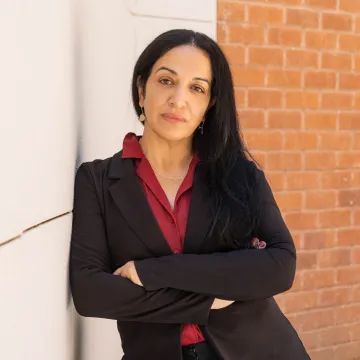
Borderland Migrations & Metaphors (BMM) is a creative inquiry that uses pláticas in combination with podcasting to produce trans-disciplinary stories of the U.S.-Mexico border. Plática is an anti-colonial feminista methodology that prioritizes social relationships based on trust, mutual vulnerability, and reciprocity. This approach contrasts power relations that characterize the traditional dichotomy of researcher-subject. BMM creates a space for co- creating knowledge through conversational interviews with BorderLab fellows from 2021-2023. Fellows are invited to reflect on their projects; how they are currently thinking about borderlands as an identity, location, and idea; and how they have been changed by borderlands research. Interviewers and fellows co-theorize as they connect everyday lived experiences with their research process. BMM conversations are recorded in a studio, thematically analyzed, sound edited, and enhanced within an iterative process. The result is a series of five podcast episodes. The BMM project will enrich public scholarship on the U.S.-Mexico border through its collective voicing of distinct insights of BorderLab fellows, its use of sound as the primary medium in which to produce knowledge, and its accessibility within and beyond the academic community.
Sama Alshaibi is Regents Professor of Art at the University of Arizona's School of Art and Director of the Racial Justice Studio at Arizona Arts. An interdisciplinary visual artist, her practice explores the notion of aftermath—the fragmentation and dispossession that violates the individual and a community following the destruction of their social, natural, and built environment. Alshaibi is the 2023 Art Matters' Betty Parsons Fellow, a 2021 Guggenheim Fellow, and a 2024 Rockefeller Foundation Bellagio Center Resident. She has exhibited in numerous biennales and museums, including the 55th Venice Biennale, the 2020 State of the Art (Crystal Bridges Museum of Art, AK), the Museum of Modern Art (New York), Institut Du Monde Arabe (Paris) and Barjeel Foundation (U.A.E.), among others. In 2015, Aperture published her monograph Sama Alshaibi: Sand Rushes In.
Genesis Arizmendi, PHD | Speech, Language, and Hearing Sciences and Cognitive Science | College of Science
Por qué no me creen: Elevating the overlooked cultural-linguistic wealth of the borderlands.
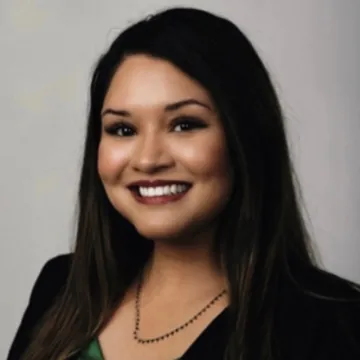
The proposed project explores the multifaceted role of language brokering in the borderlands. This research seeks to illuminate the underappreciated strengths and complexities embedded within the act of language brokering, particularly within the context of borderland cultural and linguistic dynamics. With a foundation in interdisciplinary approaches, this study employs ethnographic research methodologies, linguistic analyses, and deep community engagement to delve into the lived experiences of individuals who language broker. All language is culture. By centering on these experiences, the research will elevate often-overlooked linguistic skills, cultural knowledge, and resilience inherent in language brokering practices. At its core, this project seeks to challenge stereotypes and misconceptions surrounding language brokering, positioning it not merely as a functional act but as a profound and valuable cultural practice. By amplifying the narratives and voices of language brokers, the research aims to elevate their unique contributions to intercultural communication and community cohesion. Findings aim to facilitate a broader societal recognition and appreciation of language brokering, aiming to shift perspectives from skepticism to acknowledgment and validation.
Genesis D. Arizmendi, PhD, CCC-SLP, is an Assistant Professor with appointments in Speech, Language, and Hearing Sciences and Cognitive Science and is the Director of the Multicultural Bilingual Certificate Program in SLHS. She is an interdisciplinary clinician-scientist committed to improving clinical-research practices and educational outcomes for Spanish-English speaking communities. Within the framework of her research program, she aims to mitigate disparities and advance equity within the educational and healthcare systems.
Maurice Magaña, PhD | Mexican American Studies | College of Social & Behavioral Sciences
De Aquí y De Allá: The Cultural Politics of Race, Belonging, and Community in the US/Mexico Borderlands
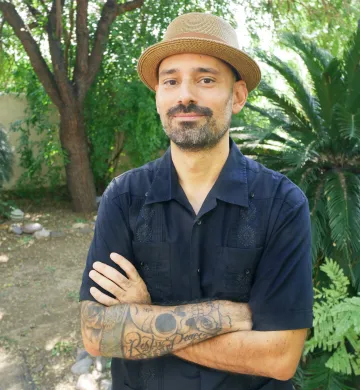
This project, De Aquí y De Allá: The Cultural Politics of Race, Belonging, and Community in the US/Mexico Borderlands, brings together artists from across the US-Mexico Borderlands for a series of public talks, workshops, and art exhibits dealing with issues of identity, community, diaspora, and belonging. The events will be organized by Professor Maurice Rafael Magaña and will coincide with his Mexican American Studies course Contemporary Issues: Borderlands of Race and Belonging (MAS 365). Professor Magaña has published extensively on the cultural politics of youth activism and migration- issues which will be explored in conversation with artists, students, and community members via this Spring 2023 series. Students will have the opportunity to learn from local and visiting artists on how to use a variety of artistic, print, and digital media to document grassroots histories and archive alternative narratives to empower their communities. Events will include a zine-making workshop, art exhibit, written and visual storytelling workshop, and a print-making workshop.
Maurice Rafael Magaña is a sociocultural anthropologist and Associate Professor of Mexican American studies at the University of Arizona. His research focuses on the cultural politics of youth organizing, transnational migration, urban space, and social movements in Mexico and the United States. Specifically, Dr. Magaña’s work examines how youth construct themselves as political actors in relation to multiple communities across time and space. His research aims to provide a transnational perspective on historic marginalization, racialization, youth political culture and the role of art in activism. Dr. Magaña's first book, titled Cartographies of Youth Resistance: Hip-Hop, Punk, and Urban Autonomy in Mexico was published by University of California Press in 2020 and received the Anthony Leeds Prize for outstanding book by the Critical Urban Anthropology Association. His work has also appeared in Ethnic & Racial Studies, American Anthropologist, Latin American and Latinx Visual Culture, American Studies, Journal of Latin American & Caribbean Anthropology, Social Justice, and Political & Legal Anthropology Review, among others.
Marcos Serafim | Photography, Video, and Imaging | School of Art
Membrana Semipermeable - Data, the HIV/AIDS crisis and the US-Mexico border
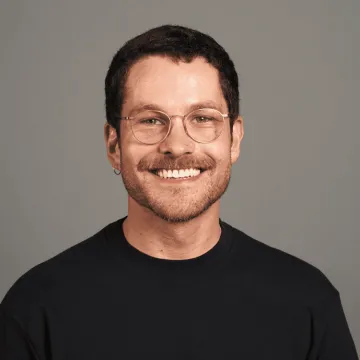
The project MEMBRANA SEMIPERMEABLE proposes the creation of an immersive audiovisual installation and a performance piece that increase accessibility to available data about HIV/AIDS in the US/Mexico border employing cutting-edge tools for data visualization and documentary strategies. The project lends immediacy to a complex entanglement of physiological, sociopolitical, and anthropological matters related to the ongoing HIV/AIDS crisis. Health risks travel fluidly between borders. At the periphery of both countries’ economies, the region is affected by systematic social and economic disparities that co-exist with institutional racism and structural violence. In Arizona alone, HIV incidence among White individuals has had a 64% decrease from 1988 to 2020, whereas Hispanic individuals have had a 49% increase in new infections during the same period. In response to a pressing intersectional matter, the project explores queer-mestiza/o-PLWH (person living with HIV) subjectivity merging lens-based and computational strategies for image generation. This CFP Mellon-Fronteridades Faculty Fellowship application requests funds for the installation and performance design, and for the presentation of the creative work to the Tucson community.
Marcos Serafim is a Brazilian artist and researcher working with imaging, video and sound across theatrical exhibition, installation, and performance. His practice investigates social and political subjects while exploring their relations to technology with the goal of producing works that are socially relevant, critical, and poetic. These subjects include: the HIV/AIDS crisis; religious African-Brazilian minorities in rural Brazil; Haitian history of revolution and social calamity; and other religiously, racially, and sexually minoritized groups. His approaches include performative situations, material encounters with digitality, resignification of archival imagery, and critical engagement with subjects, contexts, and spaces. Serafim's practice brings awareness to material and social implications of media while praising sensorial and poetic capabilities to engage viewers in reflection and critical thinking. Serafim holds a BA in Film and Video from Parana State University in Brazil, an MA in Studio Art from Eastern Illinois University, and an MFA in Studio Art from Michigan State University.
Gabriela Valdez, PhD | Zuckerman College of Public Health & Rebecca Crocker, PhD | Cancer Center
Botiquín Fronterizo
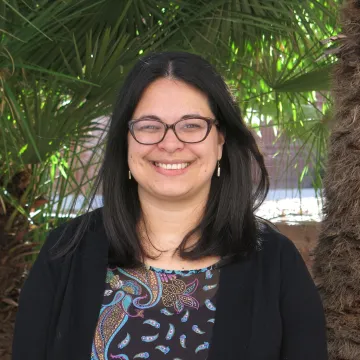
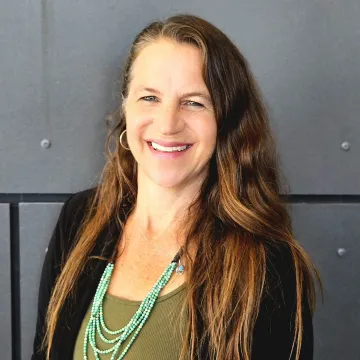
Botiquín Fronterizo is an interdisciplinary mapping project aimed to document the availability and nature of botanical, pharmaceutical, spiritual, and other materials utilized by Mexicans in lay healing practices on both sides of the US-Mexico border. The project seeks to expand scholarship on the prevalence and significance of Mexican Traditional Medicine (MTM) along the borderlands by producing a culturally and historically grounded visual portrayal of the diversity of venues Mexicans access for their healing supplies.
The Botiquín Fronterizo project will be conducted collaboratively by a binational research team representing researchers from the border states of Arizona and Sonora. The mapping of available materials will include commercial sites, as well as outdoor locales such as public lands and community gardens available in Ambos Nogales. This project will position the research team to extend the prototype produced here to cover the length of the entire US-Mexican border. Subsequent research will incorporate documenting household practices, community narratives, and knowledge sharing to elevate the lived experiences of borderlands communities and the ways lay healing relates to sense of place, cultural identity, and health in the borderlands.
Dr. Gabriela Valdez is the Director of Global Health Programs and Global Education at the University of Arizona Mel and Enid Zuckerman College of Public Health. She is also an Assistant Professor of Practice in the Health Promotion Sciences Department. Dr. Valdez has had the opportunity to work in the field of international education for the last 17 years teaching, creating, implementing, and overseeing international programs in over 20 countries around the world. She received a Ph.D. in International Education & Global Perspectives from the University of Arizona. Dr. Valdez' research interest focuses on comparative studies, intercultural communication, global health, internationalization and contextualization of the curriculum, international students' experiences, and international collaboration.
Dr. Rebecca Crocker is a medical anthropologist who takes a multi-disciplinary and community-centered approach to investigating the intersection of migration and health amongst Mexican immigrants (PhD. Anthropology, UA, 2016; MA Latin American Studies, Stanford University, 1999; BA History, Stanford University, 1994). Her work as part of team science studies in the University of Arizona College of Public Health focuses on contextual factors that influence the heavy burden of chronic disease and related complications affecting Mexican communities in the US Southwest, community levels sources of stress and resilience, the emotional experience of migration, traditional healing modalities, and binational barriers to medical care access. Her work has been widely published in academic journals of anthropology, public health, and ethnohistory, as well as applied reports designed to meet the needs of local service organizations and Tucson city efforts. Her doctoral studies at the University of Arizona used anthropology as a lens to explore the how emotional suffering related to migration was perceived by migrants to impact their health. This work was among the first to argue that emotional distress be considered as an important causal factor in immigrant health declines post migration, which was subsequently cited in the Washington Post. Prior to returning to graduate school, Rebecca worked in and researched among Latin American immigrant communities in California, Arizona, and North Carolina for over a decade, serving as a public-school teacher, violence prevention organizer, and certified language interpreter.

